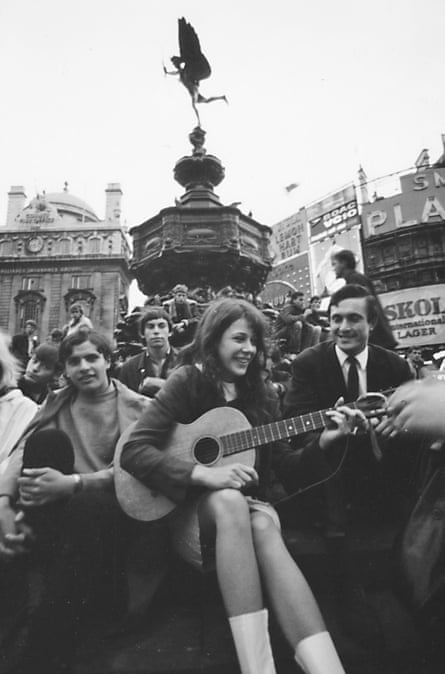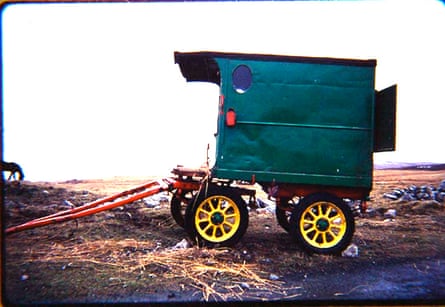On paper, what Vashti Bunyan did in the late 1960s sounds like the ultimate hippy dream. A young female singer-songwriter leaves London for the Outer Hebrides with her boyfriend, travelling in a wagon drawn by a black horse called Bess. The 650-mile trip takes two years; she makes an album about it, 1970’s Just Another Diamond Day, full of precise, quietly sung songs such as Glow Worms and Rainbow River, conjuring atmospheres of innocence and wonder.
Only a few hundred copies were pressed before it disappeared almost immediately into obscurity. Thirty years later, it was rediscovered, reissued and Bunyan’s career was revived. Two new albums, international tours and a 2008 documentary followed, plus collaborations with young artists she had inspired: Joanna Newsom, Devendra Banhart, Animal Collective and Max Richter among them. Now comes Wayward, a book Bunyan began in 1994 “to explain to my kids why they had lived a life less than ordinary – although then I sent out my synopsis to silence”. Returning to it during the first Covid lockdown, a story steeped in trauma, grief and poverty emerged – not just a dream.
Those who have called her style “fragile” or “vulnerable” may be surprised by the stronger character in these pages. “I hate those words,” Bunyan, 76, says, her accent belying the many years she has spent in Scotland since her childhood in London. “And twee.” She delivers the word with bite.

I meet Bunyan not in the thatched Berneray barn where her trip ended up in 1970 – she lived there for only six months – but on a bustling staircase at Edinburgh’s main station, in her jeans, smock top, bangles and trainers, with her partner of nearly 30 years, Al Campbell. They walk me to their nearby Georgian flat: music magazines and posters from Bunyan’s 21st-century tours line the bathroom, while pretty crockery sets, china dogs, drawings and ephemera crowd shelves and cabinets. “I wonder if the feeling that I couldn’t keep things when I was younger has made me keep so much,” Bunyan says, settling down, pouring the tea. “Because the wagon couldn’t be too heavy. We had to leave so many things behind.”
Born in 1945, by far the youngest of three children after a brother, John, and sister, Susan, Bunyan was told she was named after a boat owned by her father, John (a dentist “and a bit of a rogue”, she adds – he would sell her instruments to passing scrap merchants). Vashti had also been a nickname for her mother, Helen, inspired by the Old Testament queen who refused to show off her beauty before her husband’s cronies, before being banished; Bunyan recalls watching her mother secretly dancing and singing when she was a child.
She compares her to Molly Drake, the talented mother of Nick, whose soft songs went unreleased in her lifetime. “Molly couldn’t take that talent out into the world in her life, any more than my mother could have. And once you were married, that was it – and I didn’t want that.”
So the teenager threw herself into music. In her book, she recalls a 1961 Cliff Richard gig in Blackpool, where she felt “incandescent” with glee. A few years later, after being kicked out of the Ruskin School of Art (where she befriended Michael Palin and Terry Jones), she’s knocking on doors in Tin Pan Alley, knowing her tender songs could be hits. A female agent introduces her to the Rolling Stones manager, Andrew Loog Oldham, who starts grooming her to be the next Marianne Faithfull, to her distaste. He admitted in the 2008 documentary that her song I Want To Be Alone should have been the A-side of her debut single. Instead she was given a Mick Jagger and Keith Richards composition, Some Things Just Stick In Your Mind, for which Jimmy Page played guitar.
Bunyan enjoyed performing on TV pop shows. “It felt like young people like us were grabbing the moment. But it was also as if I was watching it from the outside.” She was struggling with her mental health through those years, her book reveals; prescription drugs made things worse. One day, Bunyan screamed at her mother for not understanding her agonies, and moments later, her mother collapsed with a stroke. A rare heart condition and cancer were also diagnosed at hospital; her mother was never the same. “I was terrified, terrified,” Bunyan remembers. “And also guilty as hell.”
Soon after, Bunyan reconnected with Robert Lewis, a rebellious art student she had met the previous year as a hitchhiker. One day, he said he had cast a spell on her, and that she would never leave his side. They briefly lived in a field, then Donovan – a famous friend of a friend – said he was setting up a commune on Skye. He would go up in his Land Rover. Bunyan and Lewis had nothing but a grandfather clock to sell. This got them their wagon and horse, but the journey “was not a statement of any kind” for Bunyan, she says. She began the journey shoeless, wearing only her late aunt’s 1930s nightdress, being stared at by bus drivers on Islington High Street.
It was a way to escape distress. “It felt ephemeral, but with a purpose: we didn’t know where we were going to be tomorrow, but it’d be somewhere down the road. What saved me was that I didn’t have to think too hard about anything except wood for the fire, water for the horse. Immediate things.”

Lewis’s appearances in the book are edgy but slight. “I could have said so much, but wanted it to be my story,” Bunyan says; they have three grownup children together – Leif, Whyn and Benjamin – and you sense she still wants to protect them. Late on in the book, she writes that their relationship was open but one-sided: “I instinctively understood that only one of us, in the kind of couple that Robert and I were, could be the one to have other people.” She also mentions “trying not to be hurt … [to] not let caustic jealousy overwhelm my days”.
She would never have instigated the trip herself, she says, but she wouldn’t have missed it for the world. “When we met, we did properly meet in our ambition to shape our lives differently, in a rejection of the world where we felt disapproved by others so much.” They learned to be self-sufficient by finding things and selling them; this continued into parenthood, when they set up a furniture restoration business, stripping pine and waxing wood. They also learned lots about the kindness of strangers, and Bunyan’s portraits of older women are especially tender – such as the islander Wally Dix, named for her walrus-like daily swims in the freezing sea, who made up stories to tell visiting Scottish folklore collectors. Women like Wally were “rebellious in undercover ways and totally irreverent”, Bunyan smiles. “Values that have stayed with me.”
When Bunyan and Lewis finally got to Skye, there was no place for them or their horse at the commune. Some had left; the schoolhouse was also deliberately empty, reserved for Donovan’s return, from “world-touring and stadium-filling”, Bunyan writes, archly. Settling on the island of Berneray instead, many locals were antagonistic to them. She recorded her album in London soon after, and found out she was pregnant; she realised she didn’t want to live so remotely.
She cringes now at her naivety. “I had wanted to go back and find out how things used to be before the internal combustion engine, without thinking how hard life could be.” She remembers the electric poles coming, and a man “having the first television, so proud, lining up all the chairs in his living room”, and also a woman “hurling her beautiful Victorian oil lamp out on to the rocks, this pink glass shattering”.

She knows now what she was yearning for then. “I wanted to get back that feeling of childlike wonder, to remember what it was like to find the world extraordinary, about there being so much to learn.” She tried to convey that in her lyrics and drawings, she says, both of which feature in Wayward. Later, she shows me the lyric book she made on the trip, held together with colourful stitches, her handwriting schoolgirl-perfect inside it, her young dreams still pristine.
But she couldn’t listen to her album for decades after what she saw as its failure. “My voice made me think of sorrow and confusion. I didn’t even sing to my children.” But by the late 1990s – separated from Lewis, and by now with Campbell – she found out about the growing interest in her rare record on her new internet connection at home. That interest continues: original copies sell for an average of £1,200 on Discogs.
A reissue came out in 2000; Bunyan read out her four-star review in the Guardian to her beloved, dying brother, who “burst into tears”. In 2002, she sang on a track called Crown of the Lost by the post-rock/ambient band Piano Magic; it felt “like opening a cupboard that had been shut for 30 years”. That voice has been heard widely since – when the Avalanches sampled Glow Worms on 2020’s Reflecting Light, Bunyan “was amazed to hear that voice of mine from 50 years ago in amongst their music”.
She has also been creative in other ways, producing 2014’s Heartleap herself. “The place where I learned music production had said I was too old when I applied.” She smiles. “But I wasn’t.”
Writing a book has been her toughest task yet, but Bunyan wanted people to know that her trip “wasn’t just a lovely trip through the daffodils and daisies. But then again” – she corrects herself – “I also didn’t want to spoil the dream.”
She’s nervous about the book coming out, she adds, quickly. She still wants to run away sometimes. “A bit of that dream is still me.”

Comments (…)
Sign in or create your Guardian account to join the discussion